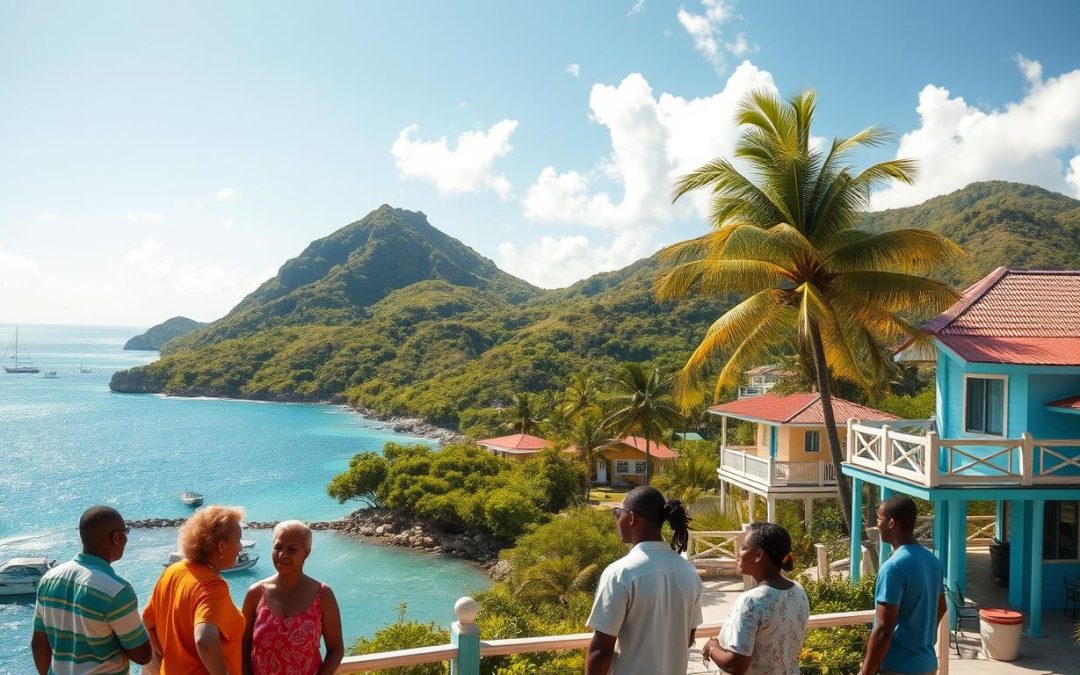Have you ever wondered how a tiny Caribbean territory manages its linguistic diversity with just over 20,000 residents? The British Virgin Islands present a fascinating linguistic tapestry that goes far beyond simple communication.
English is the official language of the British Virgin Islands (BVI), serving as the primary mode of communication across this stunning Caribbean archipelago. With approximately 90% of the population being of African descent, the language reflects a rich historical and cultural heritage.
The linguistic landscape of the BVI is uniquely complex. While formal English dominates official settings, a vibrant creole variant weaves through everyday conversations, highlighting the islands’ diverse cultural roots.
Located just 50 miles east of Puerto Rico, the British Virgin Islands showcase a remarkable linguistic adaptability. Your journey through their language will reveal how communication shapes the identity of this small but dynamic territory.
Key Takeaways
- English is the official language of the British Virgin Islands
- Creole variants play a significant role in local communication
- 90% of the population is of African descent, influencing language patterns
- The BVI’s linguistic diversity reflects its complex historical background
- Language serves as a crucial element of cultural identity in the islands
Overview of Language Diversity in the British Virgin Islands
The British Virgin Islands have a rich mix of languages. This shows their complex history and culture. Exploring this multilingual society is like diving into a colorful world.
The islands’ language roots are deep and complex. They tell a story of cultural mixing. This mix comes from centuries of colonial rule and migration.
Historical Language Development
The language history of the British Virgin Islands is fascinating. England took control in 1672, making English the main language. The islands’ language changed a lot because of:
- Colonial interactions
- African linguistic influences
- Caribbean language exchanges
Current Language Demographics
Today, the islands’ languages are a lively mix. About half the people come from other Caribbean islands. This adds to the rich language diversity.
“Language is the roadmap of a culture. It tells you where its people come from and where they are going.” – Rita Mae Brown
Linguistic Influences on BVI Culture
The culture of the British Virgin Islands is closely tied to its language. Virgin Islands Creole, based on English, is used in everyday talk. It shows how the community adapts to communicate.
| Language Type | Usage Context | Population Percentage |
|---|---|---|
| English | Official Communication | 100% |
| Virgin Islands Creole | Informal Daily Communication | 75% |
| Spanish | Growing Immigrant Community | 15% |
Learning about the languages of the British Virgin Islands opens a door to their vibrant culture. It shows how language is more than words. It’s a celebration of history and culture coming together.
English as the Official Language of BVI
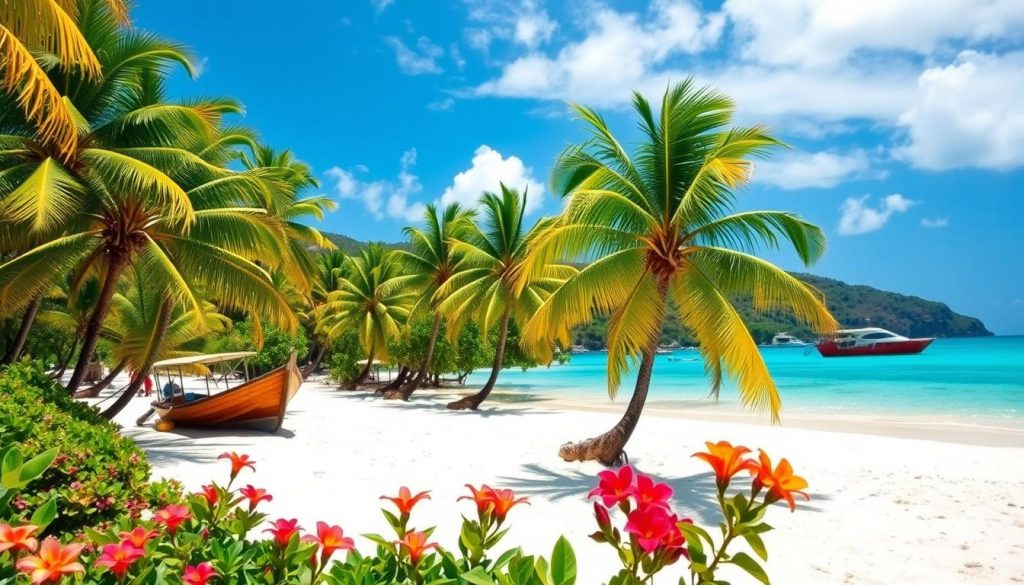
The English language is key in the British Virgin Islands. It’s the official language used in government, schools, and everyday talks. Knowing English is essential to understand life in BVI.
British English is more than a way to talk. It shows the islands’ ties to the UK. It also shapes how people work and socialize.
“Language is the road map of a culture. It tells you where its people come from and where they are going.” – Rita Mae Brown
English in the British Virgin Islands has some key traits:
- It’s the main way people communicate.
- It’s used in all official documents.
- It’s the standard in schools.
- It’s crucial for doing business with the world.
The British Virgin Islands have a high English speaking rate. About 74.7% of people speak English first. This shows English is very important here.
| Language Category | Percentage of Speakers |
|---|---|
| English Speakers | 74.7% |
| Other Language Speakers | 25.3% |
Even though British English is official, the islands are getting more diverse. You’ll hear English mixed with local words and ways of speaking.
Virgin Islands Creole: A Cultural Heritage
The British Virgin Islands have a rich cultural mix. Virgin Islands Creole is a big part of daily talk. It shows the history and social changes that have made the islands what they are today.
Origins and Linguistic Roots
Virgin Islands Creole came from a mix of cultures. It started with enslaved Africans and colonial settlers. This language is a blend of African and European languages, making it special.
- Developed during the plantation era
- Reflects multiple cultural influences
- Emerged as a practical communication tool
Modern Social Context
Today, Virgin Islands Creole is key to cultural identity. Even though English is official, Creole is alive in family and community talks. About 50% of the people, with roots from the Caribbean, help it grow.
“Language is the road map of a culture. It tells you where its people come from and where they are going.” – Rita Mae Brown
Dialectal Variations
Virgin Islands Creole isn’t just one language. It has different forms on each island. These show the unique experiences of each area.
| Island | Dialectal Characteristics |
|---|---|
| Tortola | More English-influenced pronunciation |
| Virgin Gorda | Unique vocabulary elements |
| Jost Van Dyke | Distinct rhythmic patterns |
Keeping Virgin Islands Creole alive is a strong link to the islands’ culture. It ensures this special language will keep growing for generations to come.
Spanish Language Influence in the Territory
The British Virgin Islands have a lively language scene. Spanish is becoming more common as people from Latin America move here. This makes the area a rich mix of languages.
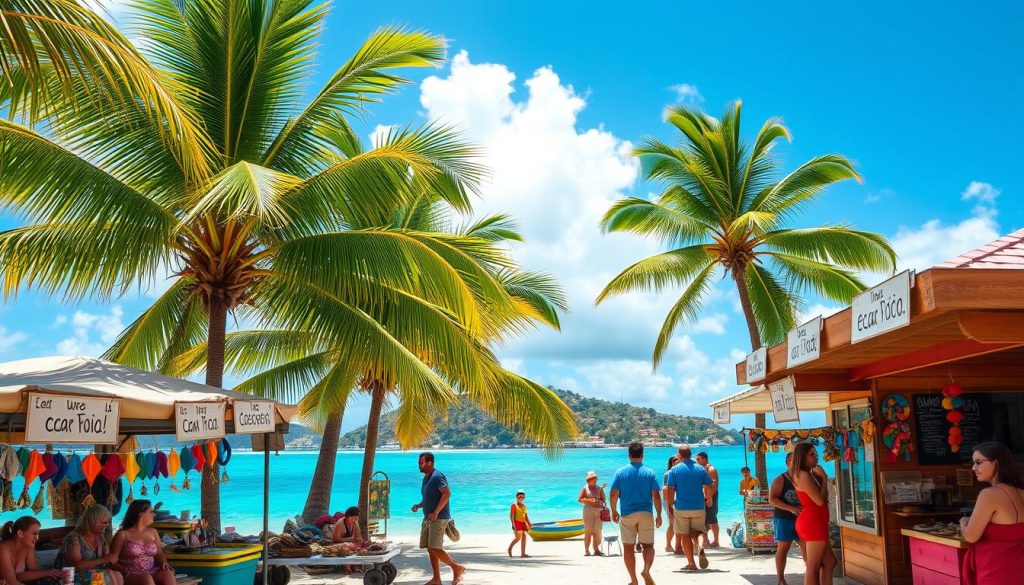
- Puerto Rican immigrants
- Dominican Republic residents
- Venezuelan migrants
- Other Hispanic communities
Trade and tourism links with Latin America boost Spanish here. Businesses and international dealings make Spanish more useful every day.
“Language is the road map of a culture. It tells you where its people come from and where they are going.” – Rita Mae Brown
Spanish use varies across different areas:
| Sector | Spanish Language Prevalence |
|---|---|
| Tourism | High |
| Financial Services | Moderate |
| Local Community | Growing |
Local schools now see the value of Spanish. They offer classes to help people learn and grow professionally.
As the British Virgin Islands grow, Spanish stays a key part of its culture and economy. You’ll see Spanish playing a bigger role in everyday life and work.
Language Distribution Across the British Virgin Islands
The British Virgin Islands have a rich mix of languages. This shows the complex culture of this Caribbean area. With about 23,000 people, the islands have a unique language scene. This is shaped by history and geography.
Looking at language patterns on different islands gives us a peek into Caribbean languages. Here’s how they are spread out:
- Around 90% of people speak English as their main language.
- About 10% use different Creole language types.
- Local dialects show many language influences.
Island-Specific Language Characteristics
Every island in the British Virgin Islands has its own language traits. Tortola, the biggest island, has the most standard English. But smaller islands like Virgin Gorda and Anegada have their own special language ways.
Urban and Rural Language Patterns
Language diversity is clear when comparing city and country talk. Road Town, the main city, has a more standard English. But country areas keep more traditional Creole.
“Language is the roadmap of a culture. It tells you where its people come from and where they are going.” – Rita Mae Brown
These language differences come from history, colonial times, and the Caribbean’s rich culture. The British Virgin Islands show how languages adapt and cultures stay strong.
Language in Education and Government
In the British Virgin Islands, English is key for official talks and learning. The rules about language make sure English is the main way to teach and talk in government.
- 100% of government institutions use English
- English is the medium of instruction in all public schools
- Approximately 90% of the population speaks English
- Literacy rate in English reaches an impressive 98%
The rules for official languages in the British Virgin Islands focus on English. Schools have plans to keep English strong and also teach other languages.
“Language is the roadmap of a culture. It tells you where its people come from and where they are going.” – Rita Mae Brown
More schools are now teaching bilingual education. About 50% of schools offer Spanish programs. This is a 25% jump in teaching many languages in recent years.
| Language Category | Percentage |
|---|---|
| English Speakers | 90% |
| Spanish Speakers | 6% |
| Haitian Creole Speakers | 2% |
| Other Languages | 2% |
Even though English is the main language, the government values different languages. The rules about language are changing. They now include both old ways of talking and new ways of learning many languages.
Impact of Tourism on Language Usage
The British Virgin Islands’ tourism industry has a big impact on its language use. With tourism making up nearly 50% of the economy, the way people speak has changed a lot. This is to meet the needs of visitors from all over the world.
Tourists add to the rich mix of languages in the British Virgin Islands. Local workers in the tourism industry are learning to speak many languages. This helps them serve visitors better.
Communication in the Tourism Sector
Tourism requires people to be very good at speaking different languages. Workers in the British Virgin Islands are learning to speak many languages. This makes visitors’ experiences better.
- Developing conversational skills in multiple languages
- Using translation technologies
- Creating multilingual marketing materials
- Offering language training for hospitality staff
Language Adaptation for Visitors
Visitors find a lively mix of languages that shows the islands’ rich culture. There are many ways to adapt language for visitors:
| Adaptation Strategy | Purpose |
|---|---|
| Bilingual Signage | Improve navigation for international tourists |
| Translated Tourism Materials | Enhance visitor understanding and engagement |
| Cultural Communication Workshops | Train hospitality professionals in cross-cultural communication |
The British Virgin Islands are making a big effort to welcome visitors from everywhere. They do this while keeping their unique culture alive.
Comparison with US Virgin Islands Language Practices
The British Virgin Islands (BVI) and US Virgin Islands show interesting differences in language. These islands are close but have their own ways of speaking and communicating. This shows how language and culture are connected.
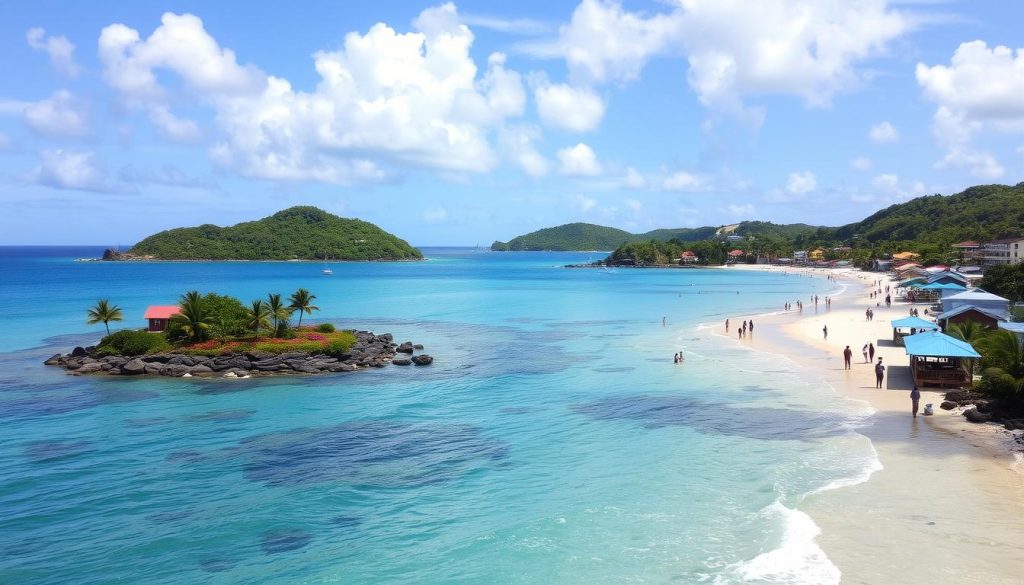
Both places use English as their main language. But, they have their own ways of speaking and expressing themselves. These differences are small but important.
- Official Language: English in both territories
- Creole Usage: Variations in dialect and prevalence
- Spanish Influence: Different levels of integration
In the US Virgin Islands, Spanish is more common because of its location. About 65% of people speak English-based Creole languages. In the BVI, this number is 25%.
“Language is the roadmap of a culture. It tells you where its people come from and where they are going.” – Rita Mae Brown
| Language Characteristic | British Virgin Islands | US Virgin Islands |
|---|---|---|
| Primary Language | English (90% speakers) | English (100% prevalence) |
| Creole Usage | 25% daily conversation | 65% English-based Creole |
| Spanish Speakers | 10% population | Significant immigrant influence |
The history of these islands affects their languages. The BVI has a more traditional way of speaking. The US Virgin Islands, on the other hand, has more language diversity.
Learning about these differences helps us understand the rich cultures of the Caribbean. It shows how each island has its own way of communicating.
Professional and Business Language Standards
The British Virgin Islands has strong language policies that help its international business grow. It’s a top financial services hub, needing clear and effective communication.
English is key for business in the BVI. Companies focus on clear, professional talk across many fields.
Corporate Communication Dynamics
In work settings, the BVI sets high communication standards. Companies here focus on:
- Precise written and spoken words
- Strong English skills
- Being ready for international business
International Business Language Practices
The finance sector needs top-notch language skills. With about 45% of income from international business, speaking well is vital.
| Business Sector | Language Requirements | Proficiency Level |
|---|---|---|
| Financial Services | Advanced English | High |
| International Business Companies | Multilingual Capabilities | Essential |
| Tourism | English + Additional Languages | Critical |
“Language is the passport to a world of professional opportunities in the British Virgin Islands.”
Companies spend a lot on language training. They see that good communication is more than just speaking. It opens doors to the world’s economy.
Cultural Expression Through Language
Language brings the British Virgin Islands to life. Virgin Islands patois is a colorful way to share stories, feelings, and traditions. It connects us deeply to our heritage.
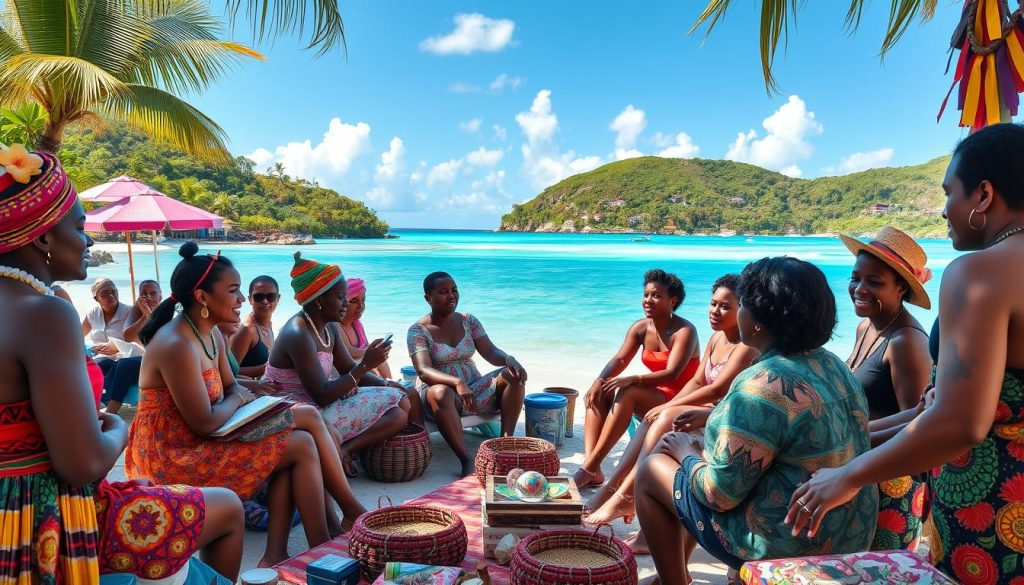
- Musical performances that blend local dialects
- Storytelling traditions preserving generational wisdom
- Oral poetry echoing historical experiences
- Contemporary artistic expressions
Caribbean languages are more than words. They hold our collective memory. Local musicians use Virgin Islands patois in their songs. This creates a strong bond with our cultural roots.
“Language is the roadmap of a culture. It tells you where its people come from and where they are going.” – Rita Mae Brown
The British Virgin Islands celebrate their language every day. They keep their cultural story alive for future generations. This way, everyone can understand and value their rich language heritage.
Language Preservation Efforts
The British Virgin Islands are working hard to save their unique languages. Language diversity in the Caribbean is a precious treasure. It needs careful preservation strategies.
The region faces big challenges in keeping its languages alive. With over 40 percent of languages worldwide at risk, the BVI’s efforts are key.
Documentation Initiatives
Local researchers and linguists are leading projects to document Virgin Islands Creole and other languages. They aim to:
- Record oral histories and language variations
- Create comprehensive linguistic archives
- Develop digital repositories of Caribbean languages
Community Language Programs
Community programs are crucial for language diversity. They focus on:
- Intergenerational language transmission
- Educational workshops for young learners
- Cultural events celebrating linguistic heritage
“Language is the roadmap of a culture. It tells you where its people come from and where they are going.” – Rita Mae Brown
The BVI’s efforts align with global trends in language preservation. They see protecting linguistic diversity as vital for cultural identity and community well-being.
Conclusion
Exploring the British Virgin Islands’ language shows a rich mix of communication. This mix reflects the territory’s complex cultural background. The official languages blend historical and modern social interactions, making the language scene lively.
Traveling through the BVI’s language world, you see English as the main official language. But local creole and other languages add richness to daily talks. The mix of ethnic groups, with 76.9% Black and 5.6% Hispanic, makes the language scene diverse and changing.
Learning about the languages spoken in the British Virgin Islands helps understand the area’s culture. Language is key in business and tourism, linking the BVI to the Caribbean and world. The islands’ language shows how words are a living part of culture, showing resilience and change.
The British Virgin Islands show the strength of language diversity. They keep heritage alive while connecting globally. Whether you’re visiting, studying, or just interested, the BVI’s language scene is captivating. It shows a community that keeps talking, growing, and succeeding.
The above is subject to change.
Check back often to TRAVEL.COM for the latest travel tips and deals.
Here are some Tours & Sightseeing suggestions that might pique your interests!
